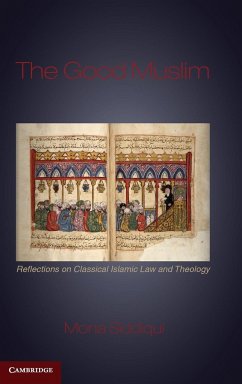
The Idea of Idolatry and the Emergence of Islam
From Polemic to History
Herausgeber: Morgan, David
Versandkostenfrei!
Versandfertig in 1-2 Wochen
47,99 €
inkl. MwSt.

PAYBACK Punkte
24 °P sammeln!
This study seeks to explain the emergence of Islam in seventh-century Arabia.Why and under what circumstances did the religion of Islam emerge in a remote part of Arabia at the beginning of the seventh century? Traditional scholarship maintains that Islam developed in opposition to the idolatrous and polytheistic religion of the Arabs of Mecca and the surrounding regions. In this study of pre-Islamic Arabian religion, G. R. Hawting adopts a comparative religious perspective to suggest an alternative view. By examining the various bodies of evidence which survive from this period, the Koran and...
This study seeks to explain the emergence of Islam in seventh-century Arabia.
Why and under what circumstances did the religion of Islam emerge in a remote part of Arabia at the beginning of the seventh century? Traditional scholarship maintains that Islam developed in opposition to the idolatrous and polytheistic religion of the Arabs of Mecca and the surrounding regions. In this study of pre-Islamic Arabian religion, G. R. Hawting adopts a comparative religious perspective to suggest an alternative view. By examining the various bodies of evidence which survive from this period, the Koran and the vast resources of the Islamic tradition, the author argues that in fact Islam arose out of conflict with other monotheists whose beliefs and practices were judged to fall short of true monotheism and were, in consequence, attacked polemically as idolatry. The author is adept at unravelling the complexities of the source material, and students and scholars will find his argument both engaging and persuasive.
Review quote:
'Never before has anyone shown with such clarity how little the so-called polytheism described in the Quran has to do with the Arabian paganism described in the tradition.' Times Literary Supplement
'I find Hawting's book very inspiring - no future scholar working with pre-Islamic times can afford to overlook Hawting's book which provides a whetstone for anyone trying to write a more positivistic analysis of pre-Islamic religion.' Acta Orientalia
'Hawting carries forward his argument in closely argued prose which is throughout fully alert to scholarship in Arabic and in European languages that relates to his case.' Bulletin of the School of Oriental African Studies
Table of contents:
Preface; Note on transliteration and dates; List of abbreviations; Introduction; 1. Religion in the jãhiliyya: theories and evidence; 2. Idols and idolatry in the Koran; 3. Shirk and idolatry in monotheist polemic; 4. The tradition; 5. Names, tribes and places; 6. The daughters of God; Conclusion; Bibliography; Index.
Why and under what circumstances did the religion of Islam emerge in a remote part of Arabia at the beginning of the seventh century? Traditional scholarship maintains that Islam developed in opposition to the idolatrous and polytheistic religion of the Arabs of Mecca and the surrounding regions. In this study of pre-Islamic Arabian religion, G. R. Hawting adopts a comparative religious perspective to suggest an alternative view. By examining the various bodies of evidence which survive from this period, the Koran and the vast resources of the Islamic tradition, the author argues that in fact Islam arose out of conflict with other monotheists whose beliefs and practices were judged to fall short of true monotheism and were, in consequence, attacked polemically as idolatry. The author is adept at unravelling the complexities of the source material, and students and scholars will find his argument both engaging and persuasive.
Review quote:
'Never before has anyone shown with such clarity how little the so-called polytheism described in the Quran has to do with the Arabian paganism described in the tradition.' Times Literary Supplement
'I find Hawting's book very inspiring - no future scholar working with pre-Islamic times can afford to overlook Hawting's book which provides a whetstone for anyone trying to write a more positivistic analysis of pre-Islamic religion.' Acta Orientalia
'Hawting carries forward his argument in closely argued prose which is throughout fully alert to scholarship in Arabic and in European languages that relates to his case.' Bulletin of the School of Oriental African Studies
Table of contents:
Preface; Note on transliteration and dates; List of abbreviations; Introduction; 1. Religion in the jãhiliyya: theories and evidence; 2. Idols and idolatry in the Koran; 3. Shirk and idolatry in monotheist polemic; 4. The tradition; 5. Names, tribes and places; 6. The daughters of God; Conclusion; Bibliography; Index.














